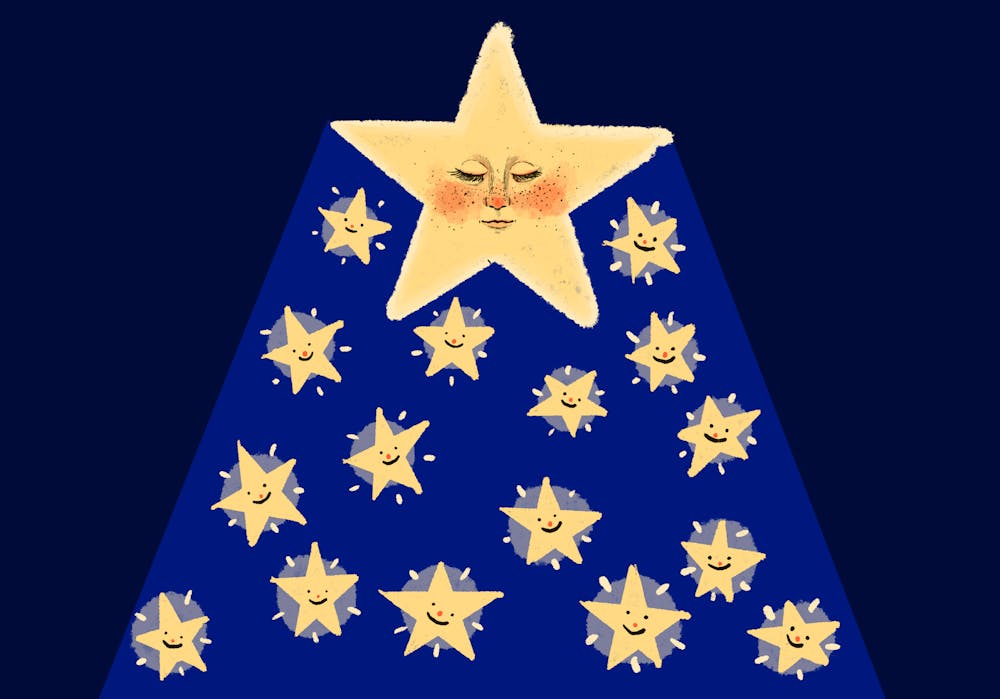I learned how to deal with space at college. I went from having my own room—big enough to fit my own bed, a couch, and every knickknack I had collected over the years—to sharing quarters one-third the size with three times the people. I barely had enough time to call my parents. Most of the time, when I called my friends across the country (and some across the ocean), they were busy (or asleep). The space between me and my old world felt huge, like a whole galaxy. I could never wrap my head around how vast the universe was, let alone Earth. With my whole world suddenly spread so far out around me, I finally had a little taste.
In November, there was the first blood moon in three years. I did not get up to see it myself. Instead, I allowed myself the few extra hours of sleep I would get by missing it. That morning, I woke up and reached for my phone again, tapping through picture after picture of the bright red orb that filled the sky last night. Students here used telescopes and special applications to see the moon in her full glory, sharing the photographs on various social media platforms. My friends across the country shared pictures too. And so did my parents. I swiped and tapped and opened messages. All of the same red moon. I felt grounded. We are in the same universe. We look up at the same stars each night.
☆
Do you see them too, the stars jumping across the night sky like bugs dancing across a river?
It began slowly. An appreciation, an affinity, an obsession. Looking at the corner of my eggshell-colored notebook page, a small figure has been etched from a jerky, five-step method ingrained into the center of my brain: a wobbly, uneven, five-point star. On my wrist, three inky stars begin to bleed into the tiny lines of my skin, jet-black like the night sky.
Stars are everywhere. The sparkle of chimes or violins or electric keyboards; five-petaled flowers, if you squint; spiky creatures lounging on the ocean floor. Cutting into a papaya in full ripeness spills seeds out of a star-shaped hole. The five green, leafy tops of tomatoes resting on the counter point away from each other, just around seventy-two degrees apart.
Star-studded and starstruck and stark. Starry-eyed girls and lemon-flavored Starbursts and singing along to “Starships.” Summer nights turn cold and dark and lonely until your gaze turns upwards, the stars a sparkling assortment served to you on an obsidian platter.
But one always loses their footing and falls, falls, falls. Starving, uneven, and broken, an empty feeling not dissimilar to the one that creeps into my brain when I draw one point, the next, the next, and the next. The proportions miscalculated, so the lines of the scribbled five-pointed shape do not meet, leaving an open gap, the insides of the star spilling onto the page.
Stars are surrounded by darkness, a darkness that hides smog and imperfections and the other side of the moon. The stars are so far away that we cannot see their imperfections, their wobbly silhouettes and misshapen orbs; they fly under a film of perfection. If we were gazed at from so far away, would we be viewed as beautiful and faultless too?
While the stars are out, the darkness hides everything else—the people I am surrounded by are suddenly only identifiable by voice. The stars are out and the darkness forces me to only focus on them and their glorious, steadfast grid of constellations, but I need to close my eyes and remember everything else around me.
☆
On that one specific night, it is dark and late and things go so wrong so fast. My friend leads me by the hand into the woods behind the big house. We lie down in the grass with our gaze upwards, the darkness a warm blanket. We make our own canopy with the stars, and I am reminded again of their ability to calm me with their pattern and their nature and their bright light.
I yearn to look up at the sky and gaze at everything, before it truly all goes dark. Before the sky drowns, suffocated by smog, pollution, secrets. The stars pepper space like silent warning signs, etched and echoed with an invisible pencil.
When a star falls, where does it go?
The shooting of a star fills me with glee, but its absence reminds me of the blank, empty feeling of loss, of losing, of feeling utterly and completely lost. Being alone, and feeling that missing piece I am so soundly used to. Or being at peace, simply by myself with the space that surrounds me.
In the daytime, the stars are hidden, not there at all. Because I love the stars, I love the sun, albeit in a different way. Beneath her basking light, I know the stars are still there, waiting patiently for me, for night to fall, to hug the moon in a celebratory greeting. I sometimes wish the stars were always the same—steadfast and reliable. Falling, falling, falling—how uneasy is it to know that those stars I look out at and see tonight may not be the same ones there tomorrow?
☆





